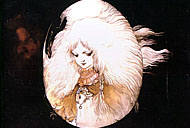
Angel's Egg
Mamoru Oshii has become a hot commodity as of late, with his noted work on such popular features as Jin-Roh, Ghost in the Shell, and the Patlabor movies. With his slow, methodical style that intrigues as it unfolds, Oshii has proven over and over again his ability to keep an audience involved despite pacing that would destroy other directors' films. Back in 1985, he premiered his most personal work, a 70-minute picture called Angel's Egg that he both wrote and directed. It stretches to the very limit the capacities of his viewers, yet is an insightful look into the very core of the man who has pondered the meaning of existence in ways most filmmakers wouldn't dare to attempt. What's amazing is that I find Angel's Egg a stunning work even though I disagree with its message (though there is some chutzpah in my even saying I understand it).
To attempt to describe the plot in a way that gives the film any sense would be like trying to describe how water is wet...it can't be done. What I can do, however, is give you events that occur chronologically. We watch a young girl of pure white innocence protecting an egg. She lives in an all-but-abandoned world of darkness and cold steel. She meets a young man, a warrior, who constantly carries on his back a gun shaped like a cross. They observe the world around them. They attempt to define who they are. The man wants to know what is in the egg, but the girl will not tell him; she knows that it will only be clear once the time is right. The egg will bring revelation--but with every revelation comes bitter cost. Such is the mere surface of the rich tapestry of this film.
Angel's Egg is a beautiful motion picture in many ways, with artwork from the famous Yoshitaka Amano, illustrator of the Vampire Hunter D books. Although there's frighteningly little animation in spots, all of it is competent and most of it is very capable. The musical score is not something anyone would buy, though it has its bright spots. It's emotive of what's lurking on and off screen rather than being at all melodic. Other than the print I saw being just a little too dark, there's no technical issues to speak of.
Beyond the production values lies something far more intriguing. Oshii, as written in various places, was a young man interested in Christianity and had considered going to seminary at one point in time. However, he abandoned that life and, from reports, much of the faith that he had in the religion. No one can miss biblical references in his works, however--whatever Oshii believes now, he has incorporated his experience with the Christian faith into many of his films explicitly. Whereas they are slight in shows such as the Patlabor movies, they are virtually everything to Angel's Egg.
Indeed, this is the way the film has to be in order to make sense; in spite of certain bits that are inexplicable, the metaphorical story here is that of faith lost. For example, our heroine fills up flasks with water. One is filled with red liquid; she pours it out, but in trying to fill that flask up she is unable to do so. It cannot hold water. The discerning viewer can take this as a metaphor for Christ's blood spilled, but that the container that promises renewed life cannot hold water. In another sequence, bulky men race after the shadow of a fish flying in the air. They can never catch the fish, though, because it is only a shadow; there is nothing real to be caught. This is a skewed view of Jesus' promise to the disciples that they would become "fishers of men." Oshii is obliquely showing that goal to be futile.
Many viewers state a lack of understanding of much of the symbolism in Angel's Egg; without a reasonable knowledge of the Bible, there would be no point of reference, so it's not surprising. But why are other things like the spaceship of stone figures in there? I can't tell you, and neither can Mamoru Oshii. He has stated on numerous occasions that he isn't all that certain what the movie is about or what it is stating. What we must finally agree on is that we are watching a confused man's working out of the faith he once had with the cynicism that plagues him. The results may still be up for grabs. I disagree with what I believe Oshii presents--my own Christian beliefs have been stated in other places before, so that's not a real shocker to many faithful readers--but his conclusions are so personal that I can diverge from his viewpoint and still respect this man's own faith journey.
Regardless of how much of the symbolism reaches the audience, anyone brave enough to face this film must steady themselves to be patient far beyond what is normally required in a theatrical presentation. An easy example of this...in one sequence, the only thing happening besides the score is a dying flame burning. It flickers for almost two minutes, then goes out. Nothing else occurs during those two minutes. Nada. Nichivo. It is an explicit statement of artistic license, but casual anime viewers likely won't make it past the first ten minutes. I would be lying to say that I find it always stimulating in the normal sense, but my intrigue far outweighs the problems entailed.
For those who like art films and find the concept of a serious, mentally provoking, controversial course in Christianity and existential thought fascinating, you must see this film. Angel's Egg is a film worthy to stand beside the likes of Ingmar Bergman's The Seventh Seal in dealing with the concepts of death, life, and belief. It is truly a gorgeous film to be experienced rather than completely comprehended.
Angel's Egg -- nothing objectionable, but not for children -- A

